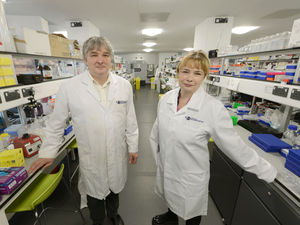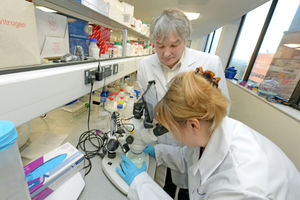Meet the team working to create the male contraceptive pill
It’s time to talk about sex – and how university researchers are pioneering a radical change in male contraception

At some point in the last few years, when men and women get as far as the bedroom door the onus has been placed on the fairer sex to be the one taking “precautions”.
At present, there are only two methods of contraception for men recommended by the NHS – while there are about 13 different options for women.
Now, though, that could all be about to change – and it’s thanks to remarkable and radical work being conducted by scientists at the University of Wolverhampton.
Attempts to develop a male pill so far have been unsuccessful owing to alterations they make in male hormone levels which can be irreversible.
But a new form of male contraception could soon become a reality after Professor John Howl and Dr Sarah Jones, from the University of Wolverhampton’s School of Pharmacy, discovered that they can temporarily switch off sperm’s ability to swim – and therefore stop them from being able to fertilise an egg. It is a radical proposition, and one that could revolutionise an entire branch of the pharmaceuticals industry.
“One of the reasons there has been a delay with male contraception is that sperm are very difficult to penetrate and get inside to target the mechanisms that govern their behaviour,” says Dr Jones.
The pair have successfully discovered a way around this roadblock and are now at the forefront of cell penetrating peptide research which it is hoped could be used in both birth control techniques and IVF in the future.

A peptide is a compound consisting of two or more amino acids linked in a chain that can control how cells work. They occur naturally but biochemists can make synthetic versions.
The pair’s research, which began in 2010, led to the discovery that cell penetrating peptides could be used to get inside sperm and bring them to a standstill by targeting the crucial protein that gives them their motility, or capacity for independent movement.
It came after they teamed up with the University of Aveiro in Portugal, where researchers had been able to identify this protein on a 194,000 euro, three-year project.
“This particular protein is only found in sperm,” says Prof Howl. “We were able to cross an otherwise impermeable barrier to manipulate the intracellular biology of sperm and switch off its motility.”
During their early research they were using bulls’ sperm, which arrives at the lab frozen in a liquid nitrogen canister.
“We were using bovine sperm because it has the most similar morphology to that of human sperm,” adds Dr Jones, who is also a reader in pharmacology.
With the help of the team in Portugal experiments were carried out using human sperm from a fertility clinic.

Tests have so far proven effective. “If a man was to go to a fertility clinic with this sample then they would be classed as infertile,” adds Prof Howl.
Further testing and fine tuning of the peptides is now taking place after the promising discovery ahead of small animal trials.
The pair hope the pharmaceutical industry will use the research to develop a new form of contraception as an alternative to condoms or a vasectomy.
It is, however, too soon to know what form that would take – it could be a gel, a lubricant, or even a nasal spray.
“The big hope for us is that the pharmaceutical industry takes it to the next stage,” says Prof Howl.
“This is a totally unique approach – nobody else has ever done this before.”
“There may be a way to engineer a plant to grow this compound in leaf or a seed – you could have a male contraceptive snack bar. Who knows where the future will go?”
It could also be a significant boost for the fertility industry as it could be a way of giving ‘sperm an extra oomph’ says Dr Howl – even if it may mean a wait before it’s widely available.
“If we can switch the motility on and off we might be able to enhance the sperm to improve fertility,” says Prof Howl.
“I’m always overly cautious and say it could be 10 years.
“It’s early days. We know about this protein and we know how to switch it on and off but there is still more research to do.”





